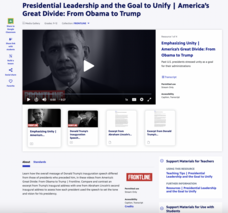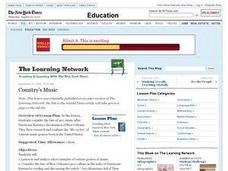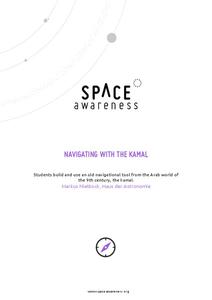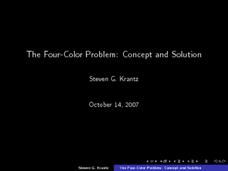National Endowment for the Humanities
Empire Intelligence Briefings
To trade or not to trade. Young diplomats put their country's best foot forward in a series of briefings for other countries about their nations. The goal is to persuade others to engage in diplomacy and trade. Using a previous lesson...
National Endowment for the Humanities
Planning for Treaty Negotiations
The party is over. Now it's time to get to work! Learners acting as agents for a country during the modern Age of Empires develop proposals to negotiate trade deals between the rising global powers. Using research from previous lessons,...
EngageNY
Reading for Gist and Answering Text-Dependent Questions: Chapter 5 of World without Fish
Discover the rules of fishing. Pupils read chapter five of World without Fish to discover ideas about the rules and laws of fishing. They use sticky notes to annotate text as they read about fishing in other countries. They focus on...
PBS
Presidential Leadership and the Goal to Unify | America’s Great Divide: From Obama to Trump
Traditionally, a United States President's Inaugural Address establishes the tone and vision for his presidency. It has stressed the goal to unify the country and bring the political parties together after what are often divisive...
Museum of the American Revolution
The Ongoing Revolution
America: a nation that continues to change. Budding historians analyze primary sources to understand the key ideas of the American Revolution and how the country has changed over time. Scholars read text from the Declaration of...
Academy of American Poets
Teach This Poem: “In This Place (An American Lyric)” by Amanda Gorman
Amanda Gorman, the United States's first National Youth Poet Laureate, is featured in a resource from the Academy of American Poets. Class members first read Dr. Martin Luther King, Jr.'s "I Have A Dream" speech and note what King wanted...
ESRI
Juneteenth: An American History through Maps
An interactive website traces the history of Juneteenth celebrations from their origin in Galveston, Texas, on June 19th to the present day. Using interactive maps, learners can find information about the African-American...
DocsTeach
The Impact of the Immigration Act of 1924
Welcome to America ... only if you're on an approved list. The activity uses a map to explain how the Immigration Act of 1924 placed quotas on immigration from certain countries, such as India. Scholars analyze the map, complete a...
Simon & Schuster
Curriculum Guide to: Pride and Prejudice by Jane Austen
An 18-page curriculum guide for Jane Austen's Pride and Prejudice consists of five lessons. The first plan asks readers to compare the manners, social behaviors, and class issues in Austen's novel to today's. Next, pupils examine a...
Newseum
Front Page Photographs: Analyzing Editorial Choices
Frontpage photographs are the focus of four activities that ask young journalists to consider what the images reveal about a newspaper and its community. To begin, groups compare what images different papers from across the country use...
DocsTeach
How Have Americans Responded to Immigration?
While America says it welcomes from other countries the tired and poor yearning to be free, the record is mixed on whether there has been a warm reception for immigrants. Class members use an interactive graphic scale and primary source...
Center for History Education
To What Extent Were Women's Contributions to World War II Industries Valued?
Women rose to the challenge when the nation's war effort called them—but were sent home when the GIs came back from World War II. Young historians consider whether the United States valued women's contributions during the war using a...
Center for History Education
Guatemalan Coup of 1954: How Did the Cold War Influence American Foreign Policy Decisions?
Was it all about the bananas—or the fear of a communist threat? Young historians use a history lab to examine documents from the American-led 1954 Guatemalan coup. Using graphics, government documents, and speeches, they examine the...
Facing History and Ourselves
Connecting to the Past
Young historians research the connections between their personal histories and the histories of our country to gain a deeper understanding of who they are. To begin, class members write about an object that they consider significant to...
Newseum
You Can’t Say That: Right to Know vs. Security Risk
Print or block? That is the question young journalists debate as part of their study of the freedom of the press. Half the class represents the journalists' legal team, and the other half represents the government's legal team. Teams...
Anti-Defamation League
Identity and Diversity in My Generation
Gen Z, those born between 1997 and 2012, according to research, is the "most racially and ethnically diverse generation in U.S. history." Gen Z high schoolers are challenged to consider how they identify themselves. They select a photo...
Curated OER
Country's Music
Jazz, Blue Grass, Hip Hop, Swing. Gospel, R&B, Ragtime, Disco. So many music genres born in the USA. After reading an article about the fate of New Orlean's Jazz after Hurricane Katrina, class members investigate the life cycles of...
Space Awareness
Navigating with the Kamal
Historians have proven that as early as 1497 skilled navigators were using a kamal to sail across oceans. Scholars learn about navigation tools and astronomy before building their own kamals. They then learn how to use it to determine...
Curated OER
Geography and Culture
Students explore African geography, study the overall continent of Africa and its individual countries, discuss demographics, and participate in research and class activities.
Curated OER
Interdependence in a Global Community
Students locate the geographic origin of a variety of products used in our society. They find countries in an atlas or on a wall map. They define the term imports and emphasize the theme of MOVEMENT and use it to explain interdependence.
Curated OER
The Weather in South America
Students conduct Internet research on weather and weather conditions in South America. They read a weather report in Spanish, and answer worksheet questions on South American countries and their weather conditions.
Curated OER
And the Winner Is...
Students read the sports section of the daily newspaper to find daily totals of what countries have won medals and find articles to keep in their journal (notebook) on the different events and athletes. They then create a spreadsheet to...
Curated OER
The Four-Color Problem: Concept and Solution
Take a walk through time, 1852 to 1994, following the mathematical history and development of the Four-Color Theorem. Learners take on the role of cartographers to study an imaginary world of countries that need to be...
Curated OER
Iraq, Where's That?
Students identify the Middle Eastern countries on the map and the oil-producing countries of OPEC in the region. They examine whether the presence of important producing oil fields qualifies as a characteristic of this region.
Other popular searches
- Country Flags
- Country Project
- Country Research Projects
- Country Research
- Country Music
- Country Western
- Create a Country
- Country Reports
- Location Country
- Country Line Dancing
- History of Country Music
- Country Farm Songs

























